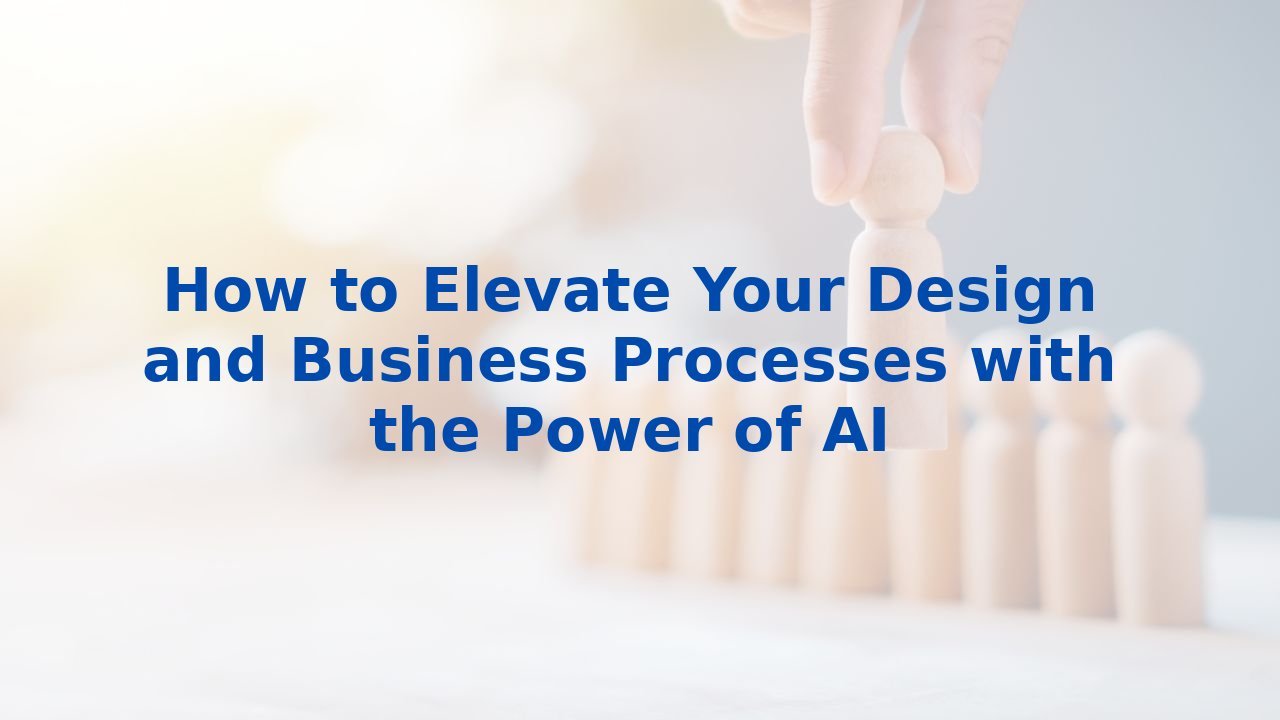How to Elevate Your Design and Business Processes with the Power of AI
How to Elevate Your Design and Business Processes with the Power of AI
In the rapidly changing world of business, staying ahead requires not just hard work, but smart work. The integration of Artificial Intelligence (AI) into design and business processes has proven to be a game changer, ushering in an era filled with potential and efficiency. Companies that embrace AI can streamline their workflows, improve decision-making, and ultimately enhance their operational performance. Here’s a deep dive into how AI can elevate these essential processes.
Understanding Business Processes
Business processes encompass a series of strategic activities and tasks aimed at achieving a specific goal. Whether it's product development, customer engagement, or internal resource management, understanding these processes is crucial. It enables organizations to dissect their performance and pinpoint areas for improvement. As competition heightens, these processes become central to the business’s ability to adapt and thrive.
Unlocking the Power of AI in Business Processes
AI is not just a fad; it’s a transformative tool reshaping the landscape of business. Let’s explore how AI enhances business processes in a meaningful way.
1. Process Discovery and Mapping
Before improvements can be made, companies need a clear understanding of their current operations. AI excels here through process mining, which reveals existing workflows and inefficiencies. By aggregating operational data, AI uncovers patterns that might evade human scrutiny. This clarity enables organizations to effectively address bottlenecks and refine the overall functioning of their processes.
2. Process Automation
One of the most significant advantages of AI is its ability to automate repetitive tasks. Imagine the time saved when mundane data entry or document processing becomes an automated function. AI-driven tools convert documents into usable data effortlessly, allowing employees to redirect their energy towards more creative and strategic pursuits.
3. Process Management and Improvement
AI doesn’t just enhance processes; it constantly monitors them. This real-time oversight allows for immediate identification and rectification of potential issues. Utilizing historical data for dynamic adaptability delivers actionable insights that lead to sustainable improvements. Organizations can thus reduce cycle times and bolster accuracy—a priceless combination in today’s fast-paced environment.
4. Decision Support and Recommendations
AI empowers organizations to harness data in extraordinary ways. Through predictive modeling, businesses can simulate various scenarios—foreseeing how pricing changes could impact profitability. Such insights streamline the decision-making process, making it less subjective and more data-driven. This shift not only enhances outcomes but also instills a culture of informed risk-taking.
5. Customer Engagement and Service
AI plays a crucial role in fostering a more engaging customer experience. With tools like chatbots, businesses can automate responses to common inquiries, enhancing efficiency while also personalizing service. Additionally, evaluating human customer service interactions with AI can highlight areas of improvement, ensuring that every customer touchpoint is optimized.
The Benefits of AI for Improving Organizational Efficiency
Integrating AI into business operations yields a multitude of advantages, which include:
- Enhanced Efficiency: By automating tasks and processes, AI frees up human resources, allowing teams to focus on higher-value work.
- Improved Accuracy: AI minimizes the risk of human error by utilizing vast datasets and identifying meaningful patterns, ensuring precise execution of tasks.
- Data-Driven Insights: Organizations can leverage actionable insights from AI to foster better decision-making and improved performance metrics.
- Scalability: As businesses grow, AI's ability to handle expansive datasets makes it a necessary ally in managing increasing workloads.
The Importance of Employee Training
While AI represents a powerful asset, the true strength lies in how well teams can utilize it. Training employees to work with AI technologies is essential for maximizing its potential. Here are a few compelling reasons to invest in comprehensive AI training:
- Understanding AI Capabilities: Proper training bridges knowledge gaps, empowering employees to harness AI’s capabilities effectively.
- Enhanced Decision-Making: Familiarity with AI-driven insights allows staff members to make informed decisions that contribute to strategic goals.
- Improved Collaboration: Training fosters synergy between human intuition and AI analytics, leading to more productive and efficient workflows.
Conclusion
The incorporation of AI into design and business processes offers considerable advantages, from efficiency improvements to enhanced decision-making capabilities. While the technology itself is vital, the knowledge and expertise of your workforce is equally critical in leveraging AI’s full potential. By investing in employee training, organizations can blend technological prowess with human ingenuity, creating a foundation for unparalleled growth and success. In this journey towards innovation, it's clear that businesses willing to adapt will emerge as leaders in the evolving landscape.



